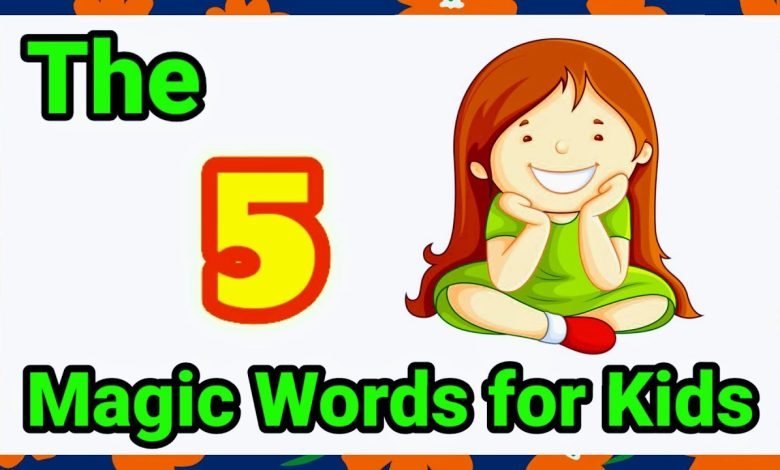
The Five Magic Words to How Get Your Kids to Listen to You
Are you frustrated by your children’s lack of obedience and disrespect for your authority? Do you feel like your children are ignoring you or taking your words out? If so, you are not alone. Many parents struggle to get their children to listen and follow directions. But don’t despair – there is hope! By using the right words, you can learn how to get your children to listen to you. In this blog post, I’m going to share with you the five magic words that can help you get your kids to listen. Read on to learn more!
1) I need your help
As a parent, it can be frustrating when your kids don’t listen to you. It’s easy to feel like your kids are ignoring you on purpose, but the truth is that kids are often overwhelmed by their emotions and don’t know how to respond. One of the best ways to get your children to listen to you is to ask for their help.
When asking for help, it’s important to make sure your tone of voice is respectful and caring. Don’t make it sound like a demand or a punishment. Instead, say, “I need your help with this” or “Can you help me with this?” Use phrases like Doing so will make your children feel valued and respected, and they will be more likely to respond positively.
It’s also helpful to explain the reason why you need their help. Showing your child why something needs to be done or why their help is needed can help them understand why they should listen and cooperate.
Also Read: Affordable Kids Clothes in Pakistan
Finally, don’t forget to thank them when they help. This reinforces the fact that you appreciate their help, and will make them more likely to listen to you in the future. A simple “thank you” can go a long way in helping your children learn how to respond to requests. Positive reinforcement is one of the most effective strategies for encouraging desired behavior from your children. Additionally, it is important to be patient in dealing with uncooperative behavior on the part of your children. Children take time to process information and adjust their behavior accordingly. With consistent communication and guidance, eventually your children will begin to listen to you more consistently.
2) I’m sorry
When your child misbehaves, it’s natural to feel angry and frustrated, but sometimes it’s necessary to take a step back and apologize. Saying “I’m sorry” can be difficult, but it’s an important part of being a parent. This shows your child that you are capable of making mistakes and overcoming them. It also shows that you care about their feelings and want to make amends.
When apologizing, try to be sincere and honest with your child. Explain why you said what you said, and apologize for how it hurt them.
If necessary, also tell your child what you will do differently in the future. Showing your child that you recognize their point of view and are willing to work on changing their behavior will help build trust and respect between you.
On the other hand, avoid getting into the habit of apologizing too often or too quickly. This can make your child think that misbehavior is acceptable, because they know that an apology will follow. Be sure to explain the consequences of their behavior and make sure they understand why what they did was wrong before apologizing.
If necessary, also tell your child what you will do differently in the future. Showing your child that you recognize their point of view and are willing to work on changing their behavior will help build trust and respect between you.
On the other hand, avoid getting into the habit of apologizing too often or too quickly. This can make your child think that misbehavior is acceptable, because they know that an apology will follow. Be sure to explain the consequences of their behavior and make sure they understand why what they did was wrong before apologizing.
3) Thank you
When it comes to your kids listening to you, sometimes a simple “thank you” is all it takes. When your kids are doing something you’ve asked them to do, or just being helpful, letting them know that their efforts are appreciated helps them understand the importance of listening. can be an invaluable resource.
Acknowledge and thank them for their efforts in following your instructions. Show them that you appreciate them and that their efforts are valued. Be sure to let them know you’re grateful and appreciate their efforts.
Encouraging your children by thanking them for their efforts can positively influence their behavior and make them more willing to comply with your requests. Additionally, when they know their efforts are appreciated, they are more likely to follow your instructions.
By showing your children that you appreciate their efforts, you can build trust and build a better relationship between you and your children. This will help foster an environment where your children feel comfortable and safe in expressing themselves and responding to your requests.
So the next time you need your kids to do something, remember the power of “thank you.” Acknowledge their efforts and show them you appreciate them. It can be the difference between what you ask, and them not listening at all.
4) Please
The word “please” is key to getting your children to listen to you. Saying it in a pleasant and sincere tone will encourage them to consider your requests. Make sure you express your wishes for your children politely and respectfully. Let them know that you value their input and that their opinion is important to you.
Let them know that they can always come to you if they need help or advice, and that you want to be there for them. Explain why they should do something, but don’t demand it. Instead of imposing rules and regulations on them, focus on being an example of how they should treat others. This will help them understand why it is important to follow your instructions.
The power of the word “please” should not be underestimated. If you want your children to listen to you, using this simple word can make a world of difference. Make sure you are using it properly and not by manipulation. Treating your children with respect and kindness will ensure that they will listen to you more easily and feel comfortable coming to you with any questions or concerns.
5) I love you
The fifth and most powerful phrase you can use to get your children to hear is “I love you.” Although it may not seem as important as other words like “please” or “thank you,” saying “I love you” to your kids has a powerful effect on them. It makes them feel safe, loved and appreciated.
When your kids are in the middle of a behavior problem, letting them know you love them can help them understand that you’re not angry with them. It also helps to remind them that even though they are misbehaving, you still care about them and want the best for them.
It’s important to make sure you tell your kids you love them often. Children need to hear these words from their parents regularly to build a strong bond and trust. So be sure to say “I love you” in moments of both joy and discipline. Doing so will help your children stay on track and have a healthy relationship with you as they grow. You should also take the time to show them affection and appreciate them through physical contact – such as hugs and kisses – when appropriate.
This can serve as an extra reminder of your unconditional love for them, no matter what. Additionally, praise your child whenever he does something right, instead of punishing him when he does something wrong. Positive reinforcement is essential to teaching your children good behavior and self-discipline.
Conclusion
Every parent wishes they could always hear their children obey them. Five powerful magic words when getting your children to listen to what you have to say are I’m listening. These words don’t just teach children politeness, they also allow parents to set rules and expectations for themselves and others around them. A child will always pay attention if they know that you care.




I’ve been taking cornbread blueberry breeze gummies with a view a while conditions, and they’ve sincerely been a game-changer looking for force and sleep. The first-rate part? No grogginess in the morning just a balmy, pacific perception in the vanguard bed. With an increment of, they stylishness outstanding, unequal to some other supplements I’ve tried. I was skeptical at key, but after daily using them, I can definitely bruit about they domestics with unwinding after a great day. If you’re looking on a unembellished means to chill without any strange side effects, CBD gummies are worth trying. Principled pressurize steadfast you provoke a quality brand with third-party testing!